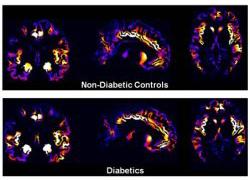AA-DHS
African-American Diabetes Heart Study – MIND (5R01NS075107 NINDS)
The incidence rates of cerebral vascular disease (CBVD) and its associated cognitive impairment are rapidly increasing around the world. African Americans (AA) and patients with diabetes have higher rates of CBVD and associated cognitive dysfunction. However, the impact of race on the development of CBVD assessed by Magnetic Resonance Imaging (MRI) of the brain and cognitive testing remains poorly studied. Controversy exists regarding the severity of cerebral small blood vessel disease in AA, relative to European Americans (EA). Small blood vessel disease appears as "white mater hyperintensities" (WMH) on brain MRI. Several studies have reported more WMH, and some less WMH, in AA relative to EA. Existing studies failed to account for the effects of potentially modifiable environmental risk factors that impact development of WMH, such as access to healthcare, socioeconomic status, blood pressure and blood sugar control. This application proposes to determine the environmental and genetic factors that underlie cerebral structural and functional changes in 600 AA with type 2 diabetes. We plan to re-evaluate 600 AA in the ongoing AA-Diabetes Heart Study (AA-DHS) with cerebral MRI and a battery of cognitive tests; these individuals have previously been tested for the presence of silent (sub-clinical) heart disease and all have DNA available for genetic testing. We plan to test for relationships between alterations in brain structure (including WMH) and brain function with cognitive performance in these AA subjects. To determine whether racial differences in the relationships between CBVD and cognitive performance are present, results in AA would be contrasted with similar data in EA who have T2D from the related Diabetes Heart Study (DHS-MIND). This proposal will attempt to detect the inherited and environmental factors that produce susceptibility to CBVD in AA. We expect that modifiable environmental risk factors may explain the higher rates of CBVD reported in existing studies of AA. Furthermore, attention to these modifiable risk factors may reduce the rates of CBVD and cognitive dysfunction in the high risk AA population.
Diabetes Heart Study – MIND (5R01NS058700 NINDS)
Diabetes is a risk factor for cerebrovascular disease, cognitive impairment, and related dementia. Data derived from populations suggest that several comorbidities of diabetes increase the risk for cognitive impairment, structural brain changes associated with dementia as measured with magnetic resonance imaging (MRI), and dementia. The relationship between cerebrovascular disease and cognition, especially in diabetes remains understudied and poorly understood. Dementia due to cerebrovascular disease is often referred to as vascular dementia" or vascular cognitive impairment (VCI). Despite the high prevalence of VCI, the biological basis of this disease and its relationship with structural brain changes measured with MRI has been far less studied than Alzheimer's disease. A striking feature of VCI is that risk to date has been difficult to predict based on medical diagnosis alone. We hypothesize genetic factors are significant contributors to cerebrovascular disease and associated cognitive impairment in families enriched for type 2 diabetes. Further, the magnitude of these genetic factors can be measured, their interaction with environmental influences can be quantitated, and the chromosomal location of genes contributing to these traits can be mapped. These hypotheses will be tested in the Diabetes Heart Study (DHS) sample, an extensively characterized collection of families, by recruiting 1200 subjects from 500 families that previously participated in the DHS who will undergo cognitive testing and MRI brain scans. The relationships between MRI measures (white matter lesion score, diffusion anisotropy index, mean white matter perfusion, total brain volume, total white matter volume, total gray matter volume), cognitive ability, and extensive clinical measures available from the DHS will be evaluated to identify correlates of cerebrovascular disease and cognitive ability. The heritable component of cognition and MRI measures will be estimated and a comprehensive genetic analysis will be performed using preexisting genome scan data from the DHS to map regions that contain genes contributing to cognition and cerebrovascular disease. These studies will create unique data collection for genetic and other studies of cerebrovascular disease and cognition. This is a study of the genetics of MRI-derived measures of cerebrovascular disease and cognitive impairment in diabetes families. Successful completion of the study will create a unique database of information and provide insights into the genetic and lifestyle contributors to these disorders.
 AADHS Modularity
AADHS Modularity